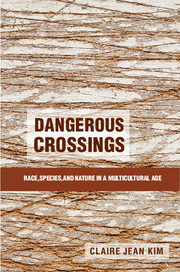Book contents
- Frontmatter
- Dedication
- Contents
- List of Figures and Tables
- Acknowledgments
- Part I Taxonomies of Power
- Part II The Battle over Live Animal Markets in San Francisco’s Chinatown
- 3 The Optic of Cruelty
- 4 The Optic of Racism
- 5 The Optic of Ecological Harm
- 6 Vision/Critique/Avowal
- Part III Other Disputes
- Part IV Conclusion
- References
- Index
5 - The Optic of Ecological Harm
Protecting “Nature” in a Neoliberal Age
Published online by Cambridge University Press: 05 April 2015
- Frontmatter
- Dedication
- Contents
- List of Figures and Tables
- Acknowledgments
- Part I Taxonomies of Power
- Part II The Battle over Live Animal Markets in San Francisco’s Chinatown
- 3 The Optic of Cruelty
- 4 The Optic of Racism
- 5 The Optic of Ecological Harm
- 6 Vision/Critique/Avowal
- Part III Other Disputes
- Part IV Conclusion
- References
- Index
Summary
There seems to be abundant evidence that these animals [imported turtles and frogs] are more ... than a threat. There seems to be no reason that we should allow these things into the state.
– Fish and Game Commissioner Mike SuttonWhen it became clear that the San Francisco Board of Supervisors would not enact the Commission on Animal Control and Welfare’s proposed ban on the sale of live animals, animal advocates pursued their cause in the courts and in the California legislature, as discussed in Chapter 3. They also approached the California Fish and Game Commission (FGC), an advisory body to the California Department of Fish and Game, the entity charged with stewardship over the state’s natural resources. Setting aside the argument about cruelty, which was beyond the purview of the Fish and Game Commission, animal advocates advanced an optic of ecological harm, arguing that turtles and frogs imported for food sometimes get released or otherwise escape into the wild, where they act as invasive species who harm native species of frogs and turtles through predation, competition, and disease. The Fish and Game Commission could fix the problem, according to animal advocates, by passing a ban on the importation of live turtles and frogs for food. When Chinese American activists once again invoked the optic of racism, the question became the degree to which this state body located in Sacramento would be insulated from the Chinese American political clout that had stymied local efforts against the markets. In the tradition of commissions, the Fish and Game Commission held public hearings, consulted scientific experts, and debated the matter on and off for thirteen years before finally recommending an importation ban in the spring of 2010. But in the end, Chinese Americans had enough political power to prevent the enactment of this ban as well.
- Type
- Chapter
- Information
- Dangerous CrossingsRace, Species, and Nature in a Multicultural Age, pp. 140 - 180Publisher: Cambridge University PressPrint publication year: 2015



